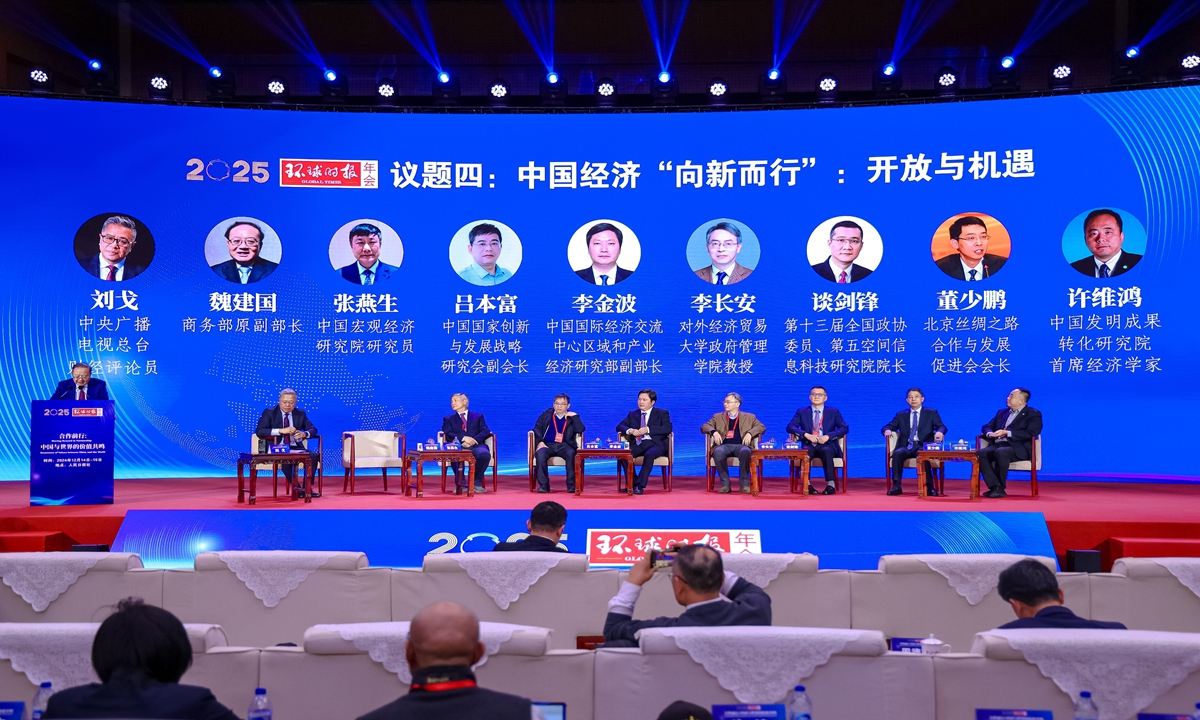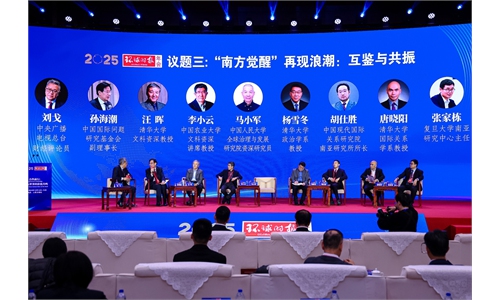
Participants speak at the fourth session "China's economy moves toward the new: opening-up and opportunities" of the Global Times Annual Conference 2025. Photos on this page: GT
Editor's Note:
The Global Times Annual Conference 2025, themed, "Moving forward in Partnership: Resonance of Values between China and the World," was held in Beijing on Saturday. The Global Times invited over 100 prominent figures and experts from politics, academia and business, both domestically and internationally, to discuss four major topics. They explored, from different perspectives, the practical paths and efforts for China and the world to move forward together and build a community with a shared future for mankind. The op-ed desk will publish relevant content for four consecutive days. Today's publication features the fourth session of the conference, "China's economy moves toward the new: opening-up and opportunities."
New quality productive forces will trigger the fourth industrial revolution
Wei Jianguo, former Chinese vice minister of commerce
I would like to present one key point: new quality productive forces will trigger the fourth global industrial revolution. The essence of new quality productive forces lies in the dramatic leap in overall societal productivity and the transformation of industries driven by technological and industrial revolutions. If the defining markers of the first three industrial revolutions were the steam engine, electric motor and computer, the core symbol of the fourth industrial revolution is "digitalization + manufacturing." Currently, China holds a unique advantage in this regard, as it possesses the world's most complete, diverse and largest manufacturing industry chain and supply chain, and is also a global leader in the digital economy. The fourth industrial revolution, represented by new quality productive forces, will not only bring a leap in productivity and a transformation in the modes of production for China's society and economy, but it will also have a profound impact on social structures, economic models, human life, and the harmonious development of humans and nature. In a sense, it can be said that the proposal of Chinese modernization represents the best land, sunlight and rain for the development of the fourth industrial revolution.
There are many uncertainties surrounding 2025, and one of the major uncertainties is "de-globalization," which includes trade protectionism, unilateralism and more. How should we respond to de-globalization? I believe that new quality productive forces are a strategic move to address de-globalization.
Tan Jianfeng, member of the 13th National Committee of the Chinese People's Political Consultative Conference and president of the Fifth Space Information Science and Technology Research Institute
When it comes to new quality productive forces, the concept of "new" is crucial. In the real economy, the true new quality productive forces lie in how to apply big data and artificial intelligence (AI) to reduce costs, improve capacity and enhance quality.
The future is the era of big data, often referred to as the "oil" of the data economy. However, the biggest problem right now is that the collection and use of data are often unregulated, or even misused, without ethical boundaries. AI is inevitably based on big data, which may infringe on personal privacy.
Therefore, the underlying logic of developing new quality productive forces lies in technological creation, innovation, industrial empowerment and foundational capabilities such as artificial intelligence and big data. However, we must not forget a critical issue: These developments cannot proceed without addressing data security.
Dong Shaopeng, president of the Beijing Silk-Road Cooperation Association
AI will be a key driver of future economic growth, but it remains to be seen which areas will experience "substitution" and achieve improvements in total factor productivity. The concept of "AI +" should be "human-centered AI+," used more for maintaining public safety and improving disaster prevention capabilities.
China has achieved good results in developing new quality productive forces
Xu Weihong, chief economist of the China Academy of Invention Achievement Transformation
2025 will be a year full of opportunities and challenges, but there is no doubt that China's economy is still in a stage of development, with a strong certainty regarding its future performance. After more than 40 years of reform and opening-up, the overall framework of China's economic system and pattern has been established. What requires more attention now is the transformation of the ingenuity and inventions of the Chinese people into productivity and profits. This is the key element of "new" in the concept of new quality productive forces.
AI has been widely adopted in China's manufacturing sector. This is evident in the informatization of enterprise digital machine tools and sensors, as well as in the various technological innovations made by entrepreneurs in response to local conditions. It represents a straightforward evolution of productivity rather than mere conceptual hype.
Lü Benfu, a professor at the School of Economics and Management, University of Chinese Academy of Sciences
Although the complexity, severity and uncertainty of the external environment faced by China's economy have increased significantly, we have still observed many positive factors that can help alleviate our concerns.
China has achieved remarkable results in cultivating and developing new quality productive forces. For example, in the realm of new energy vehicles, China has established a complete industrial chain; in terms of biopharmaceuticals, China also holds many patents and has made great progress in technological innovation. Moreover, we are very confident in the innovative spirit of Chinese entrepreneurs.
Paying attention to how to effectively develop new quality productive forces
Li Jinbo, deputy director of Regional and Industrial Economic Research Department, China Center for International Economic Exchanges
New quality productive forces involve not only "high-end technological breakthroughs," but also "the upgrading and transformation of traditional industries."
In 2023, the scale of China's digital industrialization reached 10.09 trillion yuan ($1.39 trillion), while the scale of industrial digitization was 43.84 trillion yuan. These figures are remarkable. Traditional industries are accelerating their transformation and promoting digital upgrades. At the same time, the proportion of strategic emerging industries has gradually increased in recent years. According to evaluation by some international institutions, the comprehensive score of China's future industries ranks among the best in the world, with several important technologies in a leading position.
However, there are also some "shortcomings" in China's development, such as insufficient investment in basic research.
Achieving new quality productive forces can only be realized through reforms. For example, it is essential to deepen and promote educational reforms, attract and retain top technological talent, develop technological finance, cultivate patient capital, build long-term capital, and ensure that the entire capital market better serves the development of new quality productive forces.
Zhang Yansheng, a research fellow with the China Academy of Macroeconomic Research
In the competition between China and the US in AI technology capabilities, China's advantage lies in its large market and strong industrialization, engineering and application capabilities in new technology fields.
How China can transform the advantage of domestic demand into a powerful driving force for the development of AI, chips and microelectronics, biomedicine, clean energy and other fields is crucial to the development of China's new quality productive forces. From this perspective, if we want to accelerate the development of new quality productive forces and expand domestic demand, it is an overall, strategic, and long-term matter, and we must do it well.
Li Chang'an, a professor of the School of Government, University of International Business and Economics
It is necessary to make effective use of technological progress in economic and social development and to fully harness its positive effects. Historically, technological progress has been a double-edged sword. In the short term, it can deliver a heavy blow to the economy and society, but in the long term, it tends to have a positive effect. We can observe that the development of new quality productive forces not only promotes economic and social progress, but also meets people's needs for a higher quality of life.
For example, in terms of employment, new quality productive forces have not only created a large number of jobs, but have also transcended time, space and physical limitations, enabling people in remote areas to earn income through new quality productive forces. The focus of our policy should be to give full play to its positive effects and add new momentum to economic and social development.



